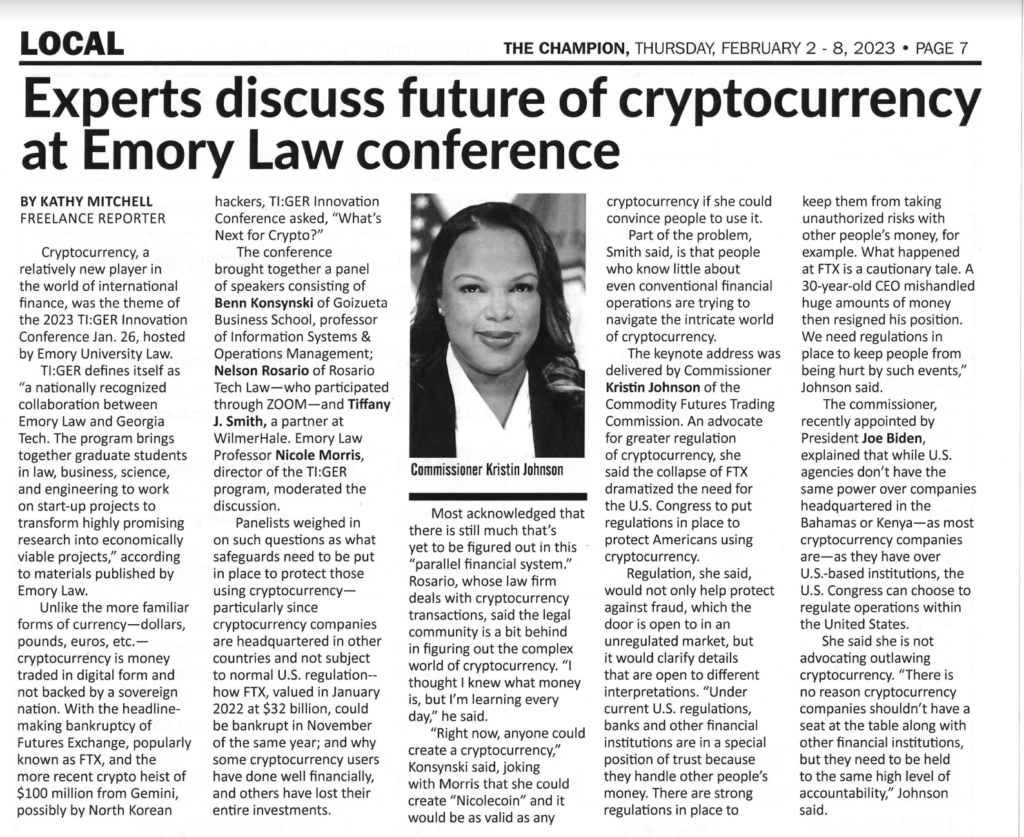BY KATHY MITCHELL FREELANCE REPORTER
Cryptocurrency, a relatively new player in the world of international finance, was the theme of the 2023 TI:GER Innovation Conference Jan. 26, hosted by Emory University Law.
TI:GER defines itself as “a nationally recognized collaboration between Emory Law and Georgia Tech. The program brings together graduate students in law, business, science, and engineering to work on start-up projects to transform highly promising research into economically viable projects,” according to materials published by Emory Law.
Unlike the more familiar forms of currency-dollars, pounds, euros, etc.— cryptocurrency is money traded in digital form and not backed by a sovereign nation. With the headline- making bankruptcy of Futures Exchange, popularly known as FTX, and the more recent crypto heist of $100 million from Gemini, possibly by North Korean hackers, TI:GER Innovation Conference asked, “What’s Next for Crypto?”
The conference brought together a panel of speakers consisting of Benn Konsynski of Goizueta Business School, professor of Information Systems & Operations Management; Nelson Rosario of Rosario Tech Law-who participated through ZOOM—and Tiffany‘ J. Smith, a partner at WilmerHale. Emory Law Professor Nicole Morris, director of the TI:GER program, moderated the discussion.
Panelists weighed in on such questions as what safeguards need to be put in place to protect those using cryptocurrency- particularly since cryptocurrency companies are headquartered in other countries and not subject to normal U.S. regulation– how FTX, valued in January 2022 at $32 billion, could be bankrupt in November of the same year; and why some cryptocurrency users have done well financially, and others have lost their entire investments.
Commissioner Kristin Johnson
Most acknowledged that there is still much that’s yet to be figured out in this “parallel financial system.” Rosario, whose law firm deals with cryptocurrency transactions, said the legal community is a bit behind in figuring out the complex world of cryptocurrency. “I thought I knew what money is, but I’m learning every day,” he said.
“Right now, anyone could create a cryptocurrency,” Konsynski said, joking with Morris that she could create “Nicolecoin” and it would be as valid as any cryptocurrency if she could convince people to use it.
Part of the problem, Smith said, is that people who know little about even conventional financial operations are trying to navigate the intricate world of cryptocurrency.
The keynote address was delivered by Commissioner Kristin Johnson of the Commodity Futures Trading Commission. An advocate for greater regulation of cryptocurrency, she said the collapse of FTX dramatized the need for the U.S. Congress to put regulations in place to protect Americans using cryptocurrency.
Regulation, she said, would not only help protect against fraud, which the door is open to in an unregulated market, but it would clarify details. that are open to different interpretations. “Under current U.S. regulations, banks and other financial institutions are in a special position of trust because they handle other people’s money. There are strong regulations in place to keep them from taking unauthorized risks with other people’s money, for example. What happened at FTX is a cautionary tale. A 30-year-old CEO mishandled huge amounts of money then resigned his position. We need regulations in place to keep people from being hurt by such events,” Johnson said.
The commissioner, recently appointed by President Joe Biden, explained that while U.S. agencies don’t have the same power over companies headquartered in the Bahamas or Kenya-as most cryptocurrency companies are-as they have over U.S.-based institutions, the U.S. Congress can choose to regulate operations within the United States.
She said she is not advocating outlawing cryptocurrency. “There is no reason cryptocurrency companies shouldn’t have a seat at the table along with other financial institutions, but they need to be held to the same high level of accountability,” Johnson said.

